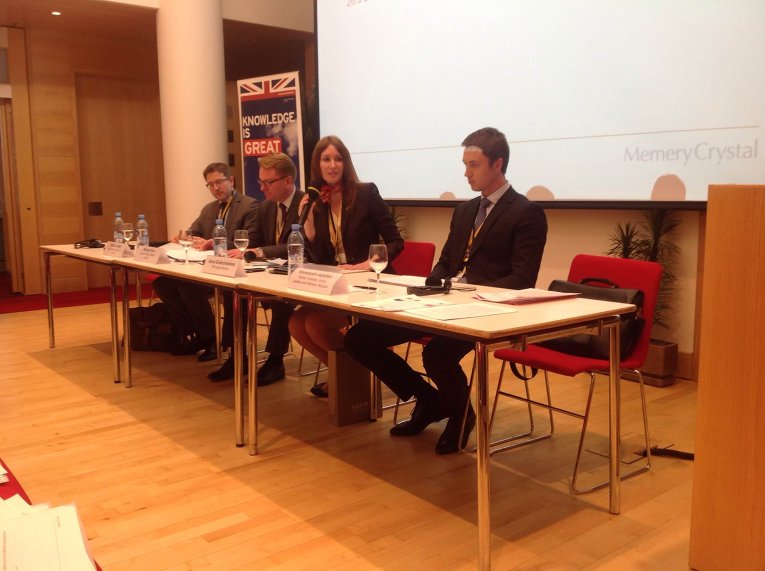MOSCOW, November 20 (RAPSI) - English and Russian law experts spoke Wednesday on topics ranging from fraud and offshore zones to the enforceability of international arbitration awards in Russia during Wednesday’s session of English Law Week, hosted at the British Embassy in Moscow.
Among Wednesday mornings regulatory-issue panelists was barrister Edward Jenkins, who spoke about the long-arm of English regulators, and on why compliance is well worth the time and energy.
Launching into the example of a company that was fined $185 million in the US for bribery in 22 countries, Russia included, Jenkins urged: “you cannot just simply sit here and say 'we don't have to worry at all.' There are many people who are going to be looking at what you may be doing once you cross the Russian border. In terms of regulators, they have considerable power and considerable intelligence sources."
He added that the UK Serious Fraud Office (SFO) works with a variety of domestic and international security, police, and customs agencies, as well as with the US Department of Justice (DOJ). He explained, "The Americans seem to be doing corporate responsibility, the SFO are dealing with individuals."
To draw out the implication of such cooperative efforts, Jenkins pointed to JP Morgan’s recent $13 billion settlement with the US Government: "That may seem like a lot, and you may think 'Oh - well they're feeling rather happy, because that means they've finished everything.' The report goes on to say that the criminal investigation continues - not in the United States, but elsewhere." Thus - Jenkin notes - the initial penalties calculation may seem to be an underestimate. He added that English tax authorities cooperate with the Internal Revenue Service (IRS) in the US.

“The English authorities will execute inquiries on behalf of other foreign states who force people in England to answer questions for foreign investigators, seize exhibits in England, and also the English authorities can make requests overseas. So you're now dealing with a truly global world," Jenkins explained.
It doesn't stop here - he warns: there are trade bodies with a worldwide intelligence network, especially with respect to IP crime.
The EU Commission, he warns, also enjoys considerable power and tends to be very well informed in terms of competition, anti-dumping, and price-fixing cartels. They work alongside the national competition authorities.
A major source of information for the authorities tends to be found in aggrieved competitors. He explains: "You think once you've got the contract, that's the end of it. But the aggrieved competitor doesn't walk away and cry in the corner these days. The aggrieved competitor says - 'Well my product was actually rather good... How on earth did they get the contract?' [The competitor] starts to investigate, and then finds that the successful contractor was seen out to dinner with the relevant government minister - and inquiries follow from that."
He noted that you'll often find that the aggrieved competitor can often come up with signifcant information that the contract was subject to influence.
He noted that the state authorities can freeze assets in order to satisfy any confiscation in the event of conviction.
Offshore zones aren’t necessarily helpful in this regard either, according to Jenkins, who pointed out when speaking with RAPSI after the presentation that, “any company which wants to operate offshore should make sure that they have proper legal advice as to the legality of that operation, which could well be justified – but the fact of just being offshore can be a warning sign for the authorities to look carefully at.”
Tatiana Minaeva – partner at Stephenson Harwood – provided detailed information on the UK Bribery Act, which was adopted in July 2011, and provided the latest update on its application.
She noted the extraterritorial character of the UK Bribery Act and the necessity of the companies to make sure certain anticorruption procedures are in place. Otherwise, a company that doesn’t pay much attention to corporate policies may find itself under the scrutiny of the SFO, and face serious challenges to its business and reputation.
Minaeva further discussed several updates in the area. She said that the UK is following a practice established in the US by introducing deferred prosecution agreements (so called DPAs). Furthermore, she described efforts to impose criminal liability for business leaders in cases lacking adequate procedures designed to prevent persons associated with the organization from engaging in bribery.
Wednesday afternoon’s panel was devoted to arbitration. Among the topics discussed were considerations to bear in mind when drafting an arbitration agreement, an overview of the London Court of International Arbitration (LCIA).
Konstantin Astafiev – partner at Korelskiy, Ischuk, Astafiev, and Partners (KIAP) – spoke on recent developments in the enforcement of international arbitration awards in Russia. He stressed that an opportunity to appeal such an award is provided in the legislation, but that it may occur only if the dispute was considered in arbitral proceedings to which Russian law applies.
Konstantin pointed out two cases, one of which ended up in the Supreme Commercial Court – Russia’s superior judicial body for the resolution of commercial disputes – and another one in the Russian Supreme Court. Both top courts stressed that if the parties to the dispute wish to appeal an award, they should turn to the jurisdiction under which the dispute was resolved in the arbitration.
Anna Grishchenkova – head of the Dispute Resolution Practice at FBK Legal – warned attendees that the international arbitration awards remain enforceable in Russia for only three years. The clock starts running from the date the award was granted, not from the date of issuance of an enforcement order.
Grishchenkova went on to discuss the hotly debated issue of the merger between Russia’s Supreme and Supreme Commercial Courts. According to Anna, we need to wait to see how the merged court will conduct its business, and whether the Supreme Commercial Court’s trend of providing guidelines on the judicial practice for lawyers will be retained.
English Law Week 2013, which is focusing this year on managing risk under English law, in an M&A and banking context, will continue Wednesday with an emphasis on dispute resolution.
Maura McGowan, Chairman for the Bar Council of England and Wales, expressed optimism when speaking to RAPSI about the potential of the conference to foster stronger ties between the English and Russian legal communities, saying: “I’m absolutely delighted to be here on English Law Week in Moscow. It’s the fourth time we’ve all met together – second time in Russia. We’ve had two in London already. It’s a great way of having lawyers work together, learn from one another, discuss their problems, find solutions, and hopefully work together in the future.”
Nicholas Fluck, President of the Law Society of England and Wales, commented earlier upon RAPSI’s request: “The UK is a major exporter of legal services and English law is the law of choice for business in so many different jurisdictions. Holding English Law Week in Moscow is an opportunity for us to showcase the skills and expertise of our members in one of the key international legal markets, and to help them build even more links with key stakeholders in the region.”
The conference has been organized by the Law Society of England and Wales, the British Russian Law Association, the Anglo-Russian Law Association, the Bar Council of England and Wales, and the British Embassy in Moscow.



